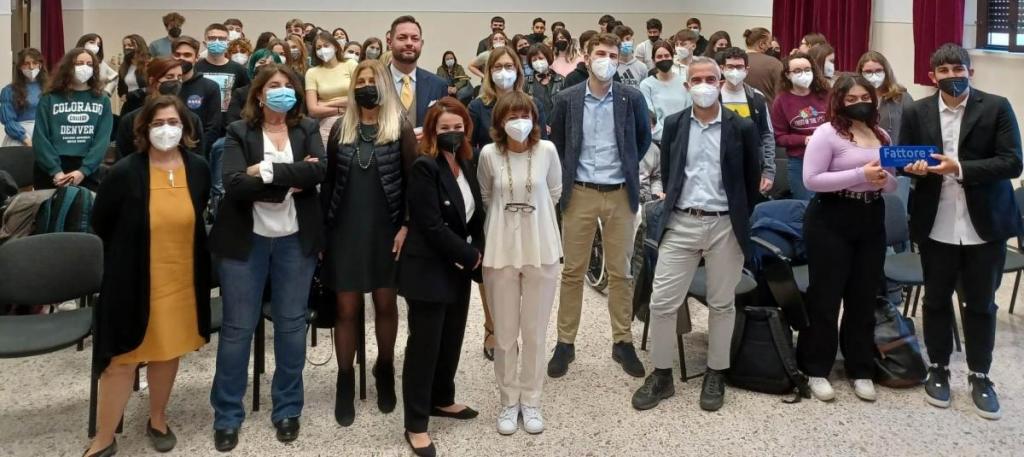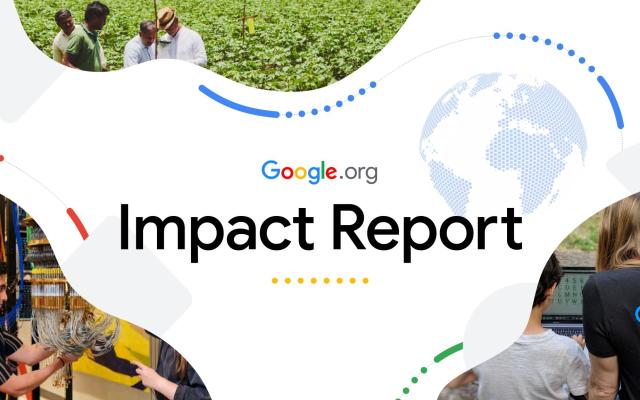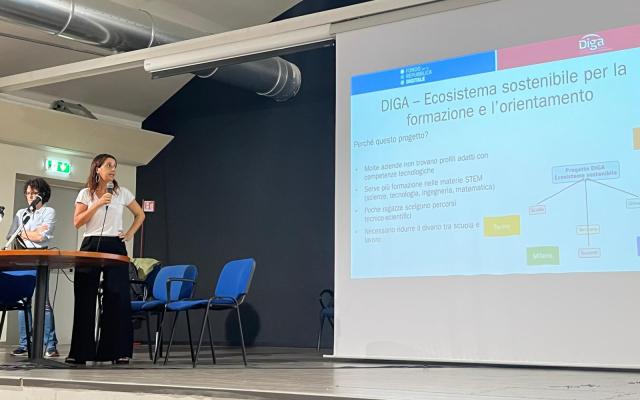Two out of every three adolescents pay attention to their mental and physical health. A healthy diet, physical activity and social relations are fundamental to this.
Today, at the local event held at the Liceo classico e linguistico Immanuel Kant in Rome, Project Factor J presented the results of the third thematic survey conducted by the University of Siena. The results point to the positive role played by correct scientific information in orienting the behaviour of adolescents towards circular health.
Factor J, the project promoted by the Fondazione Mondo Digitale in collaboration with Janssen Italia that aims to promote trust in the progress of science amongst the new generations, has brought the issue of health back to the centre of the educational process thanks to patient testimonials, the contributions of various health professionals, and the young health ambassadors.
Two out of every three adolescents pay attention to their mental and physical health. Moreover, 4 out of 5 believe that the way to keep healthy requires a healthy diet, physical activity and social relations. These are the results of the research project conducted by the Department of Political Economics and Statistics at the University of Siena that were presented today at the Rome Liceo classico e linguistico Immanuel Kant by Factor J, the project promoted by the da Fondazione Mondo Digitale and Janssen Italia, the pharmaceutical branch of the Johnson & Johnson Group, to drive the trust of the young generations in the progress of science.
The event provided an opportunity for debate amongst students and the project multi-sector network: thirteen patient associations, two scientific partners, the Rome Campus Bio-Medico University, the University of Siena, and three institutional partners, Italian Hygiene Society, Preventive Medicine and Public Health (SItI), VaccinarSì and the Italian Pharmacology Society (SIF). The day focused on therapeutic stories, based on correct scientific knowledge, to orient responsible behaviour towards everyone’s health and wellbeing.
To what extent does scientific information (articles, opinions, etc.) influence the behaviour of adolescents in their circular health choices? How can we develop a health and correct communication system? Is it possible to be both emphatic and authoritative? The strength of the Factor J local events is that it provides students with an opportunity for open dialogue with many different perspectives.
Elisabetta Durantini, Director of the Rome Liceo “I. Kant,” Loretta Mameli, Patient Engagement Lead and Pipeline Execution Lead Italy, Janssen Italia, and Mirta Michilli, Director General of the Fondazione Mondo Digitale participated in the event.
The core initiative has been the direct debates that the young ambassadors have had with health professionals. In Rome, the local ambassadors – Tommaso Cocumelli (IIS Piaget Diaz -Rome) and Laura Malaggese and Romina Capi (IIS San Benedetto – Cassino) – were asked to conduct the round table with Maria Pia Ruggieri, Director of the First Aid and Emergency Medicine Unit, Azienda Ospedaliera San Giovanni Addolorata in Rome, and Directive Council of SalutEquità; Daniela Mondatore, Director of the CittadinanzAttiva Higher Education School; Luisa Clausi Schettini, Director of the Associazione italiana contro Leucemie, linfomi e mieloma (AIL) in Rome; Felicia Giagnotti, Presidente of the Fondazione Progetto Itaca. The debate was moderated by Leonardo Radicchi, President of the Italian Pulmonary Hypertension Association (Aipi). Moreover, with the objective of documenting the backstage of science and medicine, two Janssen representatives – Emiliano Grassi, Product Manager Neuroscience, and Andrea Casati, Car-T Lead – also participated.
The research project developed by the Department of Political Economics and Statistics at the University of Siena, continues to provide a voice to adolescents. Following the first two surveys on lifestyle changes during the pandemic and trust in institutions, the third survey explores how scientific information (articles, opinions, etc.) influences the behaviour of adolescents in terms of circular health, as well as attitudes related other aspects of holistic sustainability such as nourishment, waste of resources, etc. The research clearly points out that youth are likely to modify their behaviour if they are exposed to reliable and verifiable scientific information, even if they concern clothing or fashion, two fields that have always been claimed as “independent territory.” [see Report Summary].
Over 9000 students from 109 schools in 16 Italian Regions have participated in the interactive courses organised by Factor J with patient associations and experts in a variety of therapeutic areas, an initiative that has proven successful on account of the shared stories and the ability of experts and doctors to communicate with empathy. The webinars address key issues concerning health and wellbeing in in six areas (oncology, haematology, immunology, infectious diseases, pulmonary hypertension and neuroscience). The objective of the second edition – with “In the Hands of Science” as a slogan – was to reach 100,000 students with its communications campaign. Novelties include the mini “Science Fact check” challenges to have students assess the validity of scientific news. In the meantime, the young ambassadors are working on peer training and the collaborative drafting of the first “Health Manifesto” to experiment new, clearer, more empathic and transparent, communicational paradigms to better contrast scientific undernutrition.
“Over the past two years, we have seen the project grow and become a true arena for debate and development during a very difficult period for the new generations, who were isolated by the pandemic. We also managed to transform the thematic surveys into a dynamic tool providing a voice to adolescents. We decided to support science and research through courses and sound communication to provide the empathy of therapeutic stories with correct scientific information.”
Mirta Michilli, Director General, Fondazione Mondo Digitale
“Starting out with the correct knowledge allows us to remove obstacles and win the resistance towards issues that are apparently complex, such as scientific ones. This is why we believe in Project Factor J as it provides young men and women with the tools and skills necessary to better understand and interpret reality. We hope to provide them with even more, something greater than the notions that they can find on textbooks. We want the new generations to be an active part in the development of a better future, because they are demonstrating a fantastic proactivity in the development of a different and more aware world.”
Loretta Mameli, Patient Engagement Lead, Janssen Italia




